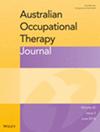‘Having the dog as part of our family gives us hope’: Experiences of the impact of assistance dogs on the occupational engagement of children with autism and their families
Abstract
Background
Autism is a developmental disorder characterised by changes in social, communication, and behavioural performance. Assistance dogs can support children with autism to engage in everyday occupations. Despite more children being partnered with assistance dogs, there is limited research regarding the impact of assistance dogs on the occupational engagement of children with autism and their families, and further research is needed to fully understand the impact of this type of support within the Australian context.
Objectives
To explore caregiver-reported experiences of an assistance dog on the occupational engagement of children with autism and their families.
Method
Using a qualitative approach, semi-structured interviews were undertaken with six caregivers of seven children with autism, who each had an assistance dog. Interviews ranged from 45 to 60 minutes in duration. Data were transcribed verbatim and thematically analysed. Trustworthiness was maximised through independent recruitment, research team discussions, member checking, and a researcher reflective journal.
Findings
Three themes were identified: participation in everyday occupations prior to and after partnering with an assistance dog, increased engagement in everyday occupations, and impact of the assistance dog on the family unit. Assistance dogs were reported to progress children from community ‘isolation’ to ‘freedom’. Participants reported the dog increased children's capacities through positively influencing completion of routines, increasing independence, and improving therapy engagement. Assistance dogs were viewed as supporting the whole family's occupational engagement. Some challenges were identified with the introduction of the assistance dog to the family unit, and with animal maintenance costs and time demands, public access rights, and limited government funding.
Conclusion
This research identifies benefits and challenges for children who partner with autism assistance dogs. It provides insights to inform assistance animal referral, assessment, and support of assistance dogs in Australia for children with autism and occupational therapists working with them.

 求助内容:
求助内容: 应助结果提醒方式:
应助结果提醒方式:


